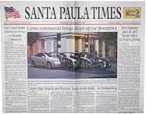The highly controversial USDA decision to allow the importation of citrus resulted in spite of a series of public hearings - including one jammed with local growers and Ventura County Agricultural Commissioner Earl McPhail held in Thousand Oaks - where growers addressed the hazards to the U.S. citrus market if diseased or pest infested imports were allowed. The U.S. District Court in imposing the ban noted that the Argentine plant protection agency, SENASA, had covered up a foot-and-mouth outbreak early in 2001 and U.S. growers’ fears of importing Argentine citrus was justified, in spite of USDA claims of oversight.“Frankly, the court is concerned about whether SENASA Reliance on the USDA’s faulty risk assessment, as well as the USDA lack of analysis of U.S. economic impact on small businesses and quality of the human environment, were also cited by the court.With the DOJ decision not to appeal, the district court’s decision “stands as the law of the land,” said Roger Witten, USCSC attorney. “In the future, if the USDA seeks to authorize the importation of citrus from disease and pest -infested regions of Argentina, it must define what it means what it says a risk [to U.S. growers] is ‘negligible’. . .it must directly show how the scientific data in the rule making record supports its conclusions and it must perform a transparent and scientifically supportable risk assessment.”“Clearly, the path forged by California citrus producers is one that will benefit growers throughout the country,” by not only protecting against the importation of pests and diseases, but by “establishing fair trading policies with partners around the globe,” said Joel Nelsen, co-chair of USCSC.“We won the battle but the war continues,” against unsound trade policies that “put American growers at risk from the introduction of devastating pests and diseases,” said Tada. “It’s nice to win one, a David and Goliath battle with just a bunch of citrus growers trying to make it in the world against very large political interests that ignored the interests of the American farmer. . .that’s what this story is all about.”
Growers celebrate as DOJ abandons citrus import appeal
April 17, 2002
Santa Paula News
The federal government has abandoned its appeal of the Argentine citrus decision, which upheld the ban on the importation of citrus into the United States, a victory for local growers as well as those throughout California and Arizona in a legal battle described as “David and Goliath” by citrus industry leader Pierre Tada, president of Limoneira Co.
By Peggy KellySanta Paula TimesThe federal government has abandoned its appeal of the Argentine citrus decision, which upheld the ban on the importation of citrus into the United States, a victory for local growers as well as those throughout California and Arizona in a legal battle described as “David and Goliath” by citrus industry leader Pierre Tada, president of Limoneira Co.According to Tada, co-chair of the U.S. Citrus Science Council (USCSC), “the Argentine citrus rule now goes back to the USDA for more work. The USDA must comply with the court decision if the rule is to be reissued.”The U.S. Department of Justice Department filed a dismissal of its appeal to the 9th Circuit Court of Appeals this week. The DOJ had filed a notice of appeal in November 2001, two months after a U.S. District Court in Fresno found that the U.S. Department of Agriculture acted arbitrarily and capriciously and exceeded its statutory authority when the USDA in June 2000 allowed Argentine citrus to be imported into the United States.The Santa Paula-headquartered USCSC, a group of more than 5,000 citrus growers in California and Arizona, originally had filed the lawsuit over concerns that the importation of citrus fruit from Argentina would also import the serious plant pests and diseases prevalent in regions of the South American country.

